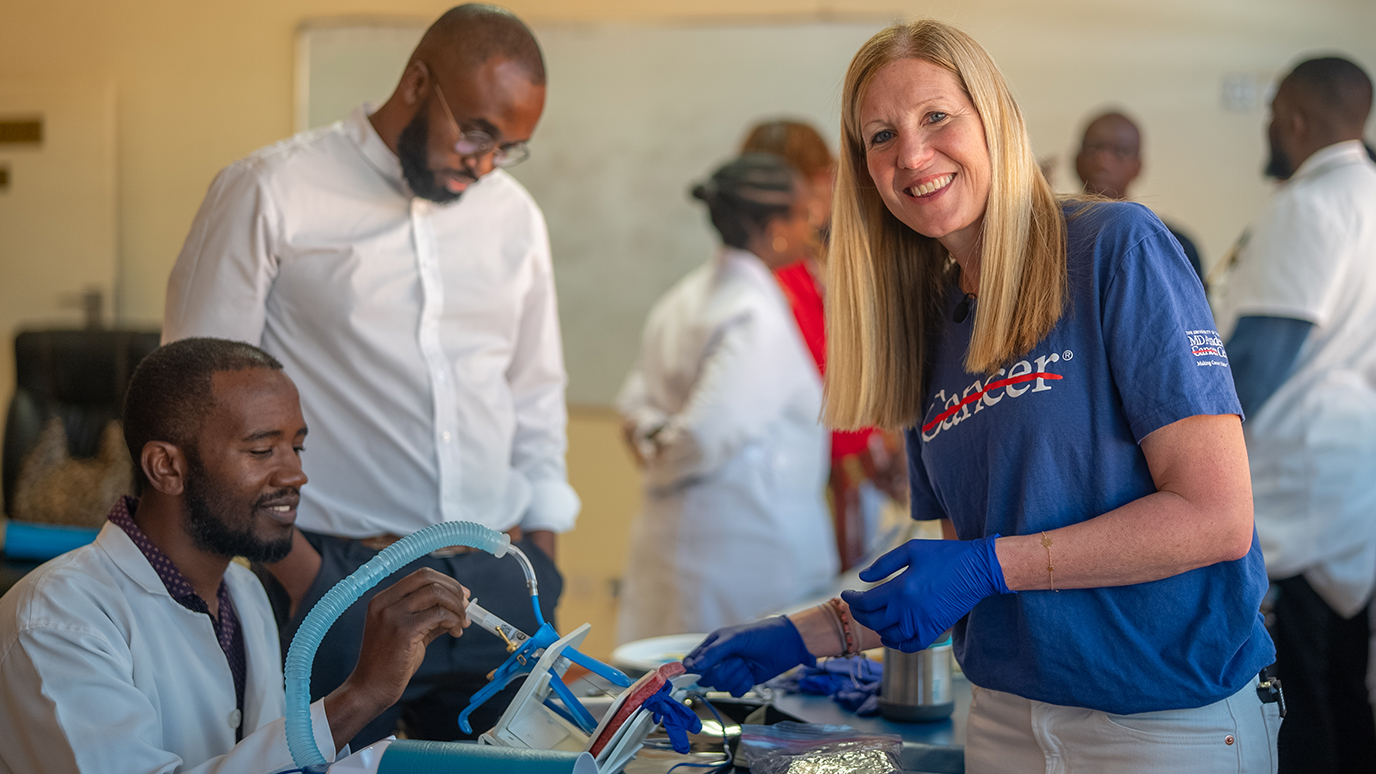Gohar Manzar, M.D., plays the ukulele
- Diseases
- Acoustic Neuroma (14)
- Adrenal Gland Tumor (24)
- Anal Cancer (66)
- Anemia (2)
- Appendix Cancer (16)
- Bile Duct Cancer (26)
- Bladder Cancer (68)
- Brain Metastases (28)
- Brain Tumor (230)
- Breast Cancer (718)
- Breast Implant-Associated Anaplastic Large Cell Lymphoma (2)
- Cancer of Unknown Primary (4)
- Carcinoid Tumor (8)
- Cervical Cancer (154)
- Colon Cancer (164)
- Colorectal Cancer (110)
- Endocrine Tumor (4)
- Esophageal Cancer (42)
- Eye Cancer (36)
- Fallopian Tube Cancer (6)
- Germ Cell Tumor (4)
- Gestational Trophoblastic Disease (2)
- Head and Neck Cancer (6)
- Kidney Cancer (124)
- Leukemia (344)
- Liver Cancer (50)
- Lung Cancer (288)
- Lymphoma (284)
- Mesothelioma (14)
- Metastasis (30)
- Multiple Myeloma (98)
- Myelodysplastic Syndrome (60)
- Myeloproliferative Neoplasm (4)
- Neuroendocrine Tumors (16)
- Oral Cancer (100)
- Ovarian Cancer (170)
- Pancreatic Cancer (164)
- Parathyroid Disease (2)
- Penile Cancer (14)
- Pituitary Tumor (6)
- Prostate Cancer (144)
- Rectal Cancer (58)
- Renal Medullary Carcinoma (6)
- Salivary Gland Cancer (14)
- Sarcoma (236)
- Skin Cancer (296)
- Skull Base Tumors (56)
- Spinal Tumor (12)
- Stomach Cancer (60)
- Testicular Cancer (28)
- Throat Cancer (90)
- Thymoma (6)
- Thyroid Cancer (98)
- Tonsil Cancer (30)
- Uterine Cancer (78)
- Vaginal Cancer (14)
- Vulvar Cancer (18)
- Cancer Topic
- Adolescent and Young Adult Cancer Issues (20)
- Advance Care Planning (10)
- Biostatistics (2)
- Blood Donation (18)
- Bone Health (8)
- COVID-19 (362)
- Cancer Recurrence (120)
- Childhood Cancer Issues (120)
- Clinical Trials (628)
- Complementary Integrative Medicine (24)
- Cytogenetics (2)
- DNA Methylation (4)
- Diagnosis (230)
- Epigenetics (6)
- Fertility (64)
- Follow-up Guidelines (2)
- Health Disparities (14)
- Hereditary Cancer Syndromes (124)
- Immunology (18)
- Li-Fraumeni Syndrome (8)
- Mental Health (118)
- Molecular Diagnostics (8)
- Pain Management (62)
- Palliative Care (8)
- Pathology (10)
- Physical Therapy (18)
- Pregnancy (18)
- Prevention (898)
- Research (392)
- Second Opinion (74)
- Sexuality (16)
- Side Effects (604)
- Sleep Disorders (10)
- Stem Cell Transplantation Cellular Therapy (216)
- Support (404)
- Survivorship (322)
- Symptoms (184)
- Treatment (1776)
Cervical cancer survivor finds care and compassion during brachytherapy treatment
4 minute read | Published January 18, 2024
Medically Reviewed | Last reviewed by an MD Anderson Cancer Center medical professional on January 18, 2024
My nutritionist and chiropractor suspected something was wrong when I could not lose weight, but I was not concerned. I did not have any cramps or pain anywhere, so what could be wrong? He suggested I get an MRI to see if I had fibroid cysts causing abdominal swelling.
My cervical cancer diagnosis
I had a pelvic MRI near my home in Dallas. The results showed I had fibroid cysts and cells on my cervix that could be cancerous. I made an appointment with my gynecologist and had a routine Pap test. She suggested I see a local gynecologic oncologist to undergo a cervical biopsy.
On April 24, 2023, I received the news that I had cervical cancer.
My local oncologist recommended I start chemotherapy and 25 external radiation treatments. After three rounds of chemotherapy, I broke out in hives all over my body. I felt miserable. I was given a steroid and Benadryl to help, but I only slept a few hours each night. They told me my cancer was early stage, but I was not a candidate for surgery. I had questions and did not feel comfortable with my medical team. I decided to get a second opinion at MD Anderson.
In June, I traveled to MD Anderson for my first appointment with gynecologic oncologist Nicole Fleming, M.D., who said I needed brachytherapy. She told me it was standard for cervical cancer patients to receive brachytherapy after external beam radiation based on my clinical stage. To avoid any delays, she recommended I finish the external beam radiation treatments I started in Dallas first given that I was in the middle of my treatment course.
Undergoing brachytherapy to treat cervical cancer
I stayed in Houston in July. On July 14, I received my first of two brachytherapy procedures at MD Anderson under the care of radiation oncologist Anuja Jhingran, M.D. She explained I would receive pulsed-dose rate (PDR) brachytherapy. This is a two-day inpatient procedure that sends a radioactive pellet into an internal applicator for 15 minutes every hour. Two weeks later, the procedure is repeated.
Before each surgery, advanced practice registered nurse (APRN) Tomar Foster-Mills walked me through what to expect in my pre-operative appointment and answered all my questions. A few minutes before the first surgery, I met resident physician Gohar Manzar, M.D., Ph.D. She was very compassionate and put me at ease.
All my nurses were amazing and kept me calm. Dr. Manzar held my hand and talked me through the procedure. Having confidence in my care team made everything so much easier. It was the complete opposite of my experience before coming to MD Anderson.
During the procedure, I had to lie flat on my back for 48 hours while the internal radiation was in place. It would run every hour for 10 minutes. I did not feel anything during those 10-minute intervals. I was kept on a strict diet with soft foods and liquids to prevent constipation since I couldn’t move.
Dr. Manzar plays the ukulele for her patients, and I looked forward to it every day. The day before my last treatment ended, she played “Closing Time” at my bedside as a tribute to finishing treatment. She took the time to FaceTime my son, so he was included. The last day was on a Sunday, and Dr. Manzar walked in at 5 a.m. on her day off to visit me. She wanted to ensure I was comfortable during the removal of my implant and congratulate me on finishing treatment. Anyone who has her as a doctor in the future will be lucky.
“What makes MD Anderson the top cancer hospital in the nation is giving patients the best treatment experience with experts and personal touches involved in our mission-driven care,” Manzar told me. “For me, this extra touch comes in the form of music therapy. It humanizes our relationship and transcends cultural and linguistic barriers.”
Why I recommend MD Anderson
By early August, I was able to return home and resume normal activities. I return to MD Anderson for a follow-up every three months for two years. During my recent appointment, my PET scan showed no evidence of disease.
I was blessed to be treated by doctors and medical staff who are experts in their areas of care. If you do not feel comfortable and confident with your doctor or care team, get a second opinion. Sometimes you must advocate for your own care. It can save your life, just like it saved mine.
Request an appointment at MD Anderson online or call 1-866-448-2086.
Related Cancerwise Stories

Advocate for your own care. It can save your life.
Michaela Urban
Survivor






